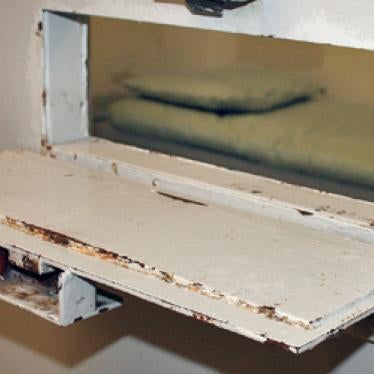At the end of March Robert Listenbee Jr. quietly started work as the administrator of the Office of Juvenile Justice and Delinquency Prevention at the Department of Justice, filling a post left vacant by the Obama administration for the past four years. There are many important issues that Listenbee, a respected public defender, must tackle, but he could have no better first accomplishment than successfully championing a federal ban on solitary confinement for children in federal custody.
The United States leads the developed world in the number and percentage of children it locks up. A large number – more than 90,000 in each of the past five years, according to Growing Up Locked Down, a report I wrote for Human Rights Watch and the ACLU – are held in adult jails and prisons, where they are often isolated from the other prisoners for their own protection. They don’t fare much better in many state juvenile facilities, where isolation practices, some deemed excessive by the Department of Justice, are widely reported. In my research, I have interviewed young people across the country who were subjected to solitary confinement in adult facilities for weeks or months, some as young as at age 13.
Solitary confinement – being held in isolation for 22-24 hours a day, day in and day out – can be harmful even for adults. But the potential damage to children, who do not have the maturity and resilience of an adult and are at a particularly vulnerable, formative stage of life, is much greater.
Kids who had been in solitary told me how they lost control. They described fits of rage, anxiety attacks, depression. They told me about being denied adequate exercise, books and education, family visits. "The only thing left to do is go crazy – just sit and talk to the walls," a youth confined in Florida told me. "Screaming, throwing stuff around – I feel like I am alone, like no one cares about me. Sometimes I feel like, why am I even living?" More than a few spoke in candid detail about trying to kill themselves. In fact, more than half of all suicides in juvenile facilities occurred when children were in isolation.
The American Academy of Child and Adolescent Psychiatrists has issued a policy urging a ban on solitary confinement, noting that because “the potential psychiatric consequences of prolonged solitary confinement are well recognized and include depression, anxiety and psychosis" juvenile offenders, due to their “developmental vulnerability,” are at “particular risk of such adverse reactions.” The United Nations Special Rapporteur on Torture has condemned the use of solitary confinement for children as a violation of the prohibition against “cruel, inhuman and degrading treatment,” banned under several human rights treaties signed and ratified by the U.S. The Supreme Court has repeatedly said that, in the context of crime and punishment, children are not just miniature adults – they are still developing, less culpable and more receptive to change – and subjecting them to the harshest punishments is cruel and unusual and violates the Constitution.
Before taking office, Listenbee served as co-chair of the National Task Force on Children Exposed to Violence. Its final report concluded that “nowhere is the damaging impact of incarceration on vulnerable children more obvious than when it involves solitary confinement.” It recommended that traumatic correctional practices, like solitary confinement, be abandoned.
Fortunately, Listenbee now has an opportunity to end solitary confinement of juveniles, at least at the federal level, and to push for change in the states. The vast majority of incarcerated youth are prosecuted by state authorities, but today there are 112 children in the custody of the Federal Bureau of Prisons. They are spread across 23 juvenile facilities which contract with the BOP to house them. But BOP’s model contract allows a range of practices that — in other juvenile facilities — are euphemisms for solitary confinement: for example, “secure confinement” for disciplinary violations and indefinite housing in “special management units.”
Because adolescents can be defiant, and hurt themselves and others, those responsible for caring for them must use a range of methods, including, in rare instances, separating them from other youth (and always separating them from adult offenders). But with adequate supervision and programming, separation can be achieved without isolation. By any name, isolation practices exercised on children are counterproductive and morally repugnant, and raise serious questions about the effects on public safety when kids come home.
Listenbee should champion a federal ban on solitary confinement for youth in federal care, and use the power of his office to disburse federal grants to push state governments to follow suit, using the federal ban as a model. His appointment gives the administration the perfect opportunity to help put an end to this cruel practice.
Kysel is the Aryeh Neier fellow with Human Rights Watch and the American Civil Liberties Union. He is the author of Growing Up Locked Down: Youth in Solitary Confinement in Jails and Prisons Across the United States.






